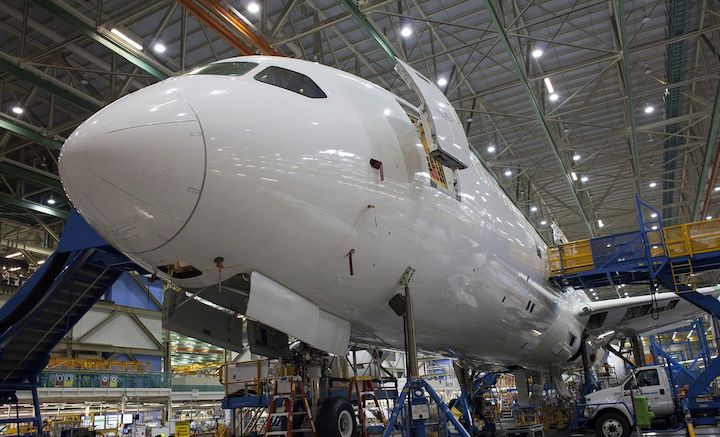S&P Global Ratings: Boeing Co.‘s affirmation of previous guidance suggests risks from its manufacturing flaw will be limited
Apr 28, 2023
S&P Global Ratings today said that its ratings and outlook on Boeing Co.(BBB-/Negative/A-3) are unchanged following the company's recent earnings announcement. Notably, the company affirmed the previous guidance for its 2023 aircraft deliveries and free cash flow. This guidance was in question following management's recent disclosure that a manufacturing flaw in a 737 MAX fuselage fitting would require additional work to correct planes in production and inventory. While near-term delivery delays are likely, the downside risk to the company's earnings and cash flow from this issue appears to be relatively muted.
Boeing's affirmation of its MAX delivery targets (though we believe it will not likely achieve the high end of its 400-450 plane target range this year because certain deliveries will be pushed beyond the peak summer travel season), despite the fitting defect, further supports our view that the risk to its earnings and cash flow will be limited. We also view the company's free cash flow guidance of $3 billion-$5 billion in 2023 as achievable, which will likely facilitate further debt reduction. We estimate Boeing's funds from operations to debt and free operating cash to debt will be in the low-double-digit percent area in 2023 and improve to levels commensurate with the current rating in 2024. However, the company has underperformed our estimates in the past. In addition, its path to improve its credit metrics remains highly sensitive to unexpected or protracted operating disruptions. As such, we will look for a greater surety that Boeing will generate and sustain stronger credit measures before revising our outlook to be stable. Alternatively, we could lower our rating if we expect the company's credit ratios will underperform due to weaker-than-anticipated global air traffic or a deterioration in its competitive position.
The company's free cash flow in the first quarter, which is its seasonally weakest quarter for free cash flow generation, was somewhat better than anticipated at negative $786 million due, in part, to the timing of an advanced payment for additional tanker aircraft. The quarter also included a previously disclosed $245 million charge related to its tanker program, though it did not otherwise face any large new charges related to its fixed-price defense contracts or increased abnormal costs, which have weighed on its results in the past.
Boeing indicated that delays related to the fuselage fittings will push some MAX deliveries past the peak summer travel season, which will make hitting the high end of its guidance in 2023 a stretch. Boeing had a strong first quarter for deliveries totaling 130 aircraft, including 113 MAX and 11 widebodies 787 planes, though we expect its deliveries will dip in the second quarter as it remediates the MAX fittings. We expect the company's cash flow will improve in the second half of 2023 as its deliveries pick up and the abnormal costs associated with its low 787 production rates decline.
Boeing expressed confidence in its ability to increase its production of both the 787 and 737 MAX this year despite the fuselage fitting problem and the fragility throughout the supply chain, which management expects will persist into 2024. The company plans to increase its MAX production to 38 per month, from 31, and its 787 productions to five per month, from three currently. Boeing also reiterated its expectation that it will receive regulatory approval in time to begin delivering the MAX-7 this year and the MAX-10 in 2024. These models are important to the company's ability to compete with Airbus SE on range and capacity with narrowbody aircraft customers.
In addition to delivering newly built planes, the company is working through its sizeable inventory of completed aircraft, including 225 737 MAXs and 95 787s as of the end of the quarter. Management indicated that approximately 75% of the MAXs in inventory require fuselage fitting remediation, though its timeline for delivering the remaining planes by the end of 2024 remains intact. This figure for its MAX inventory includes 138 planes ordered by Chinese airline customers that Boeing has not received approval to deliver. The company's guidance does not assume that it is able to deliver these planes in 2023, though commercial air travel in China has largely recovered to pre-pandemic levels. That said, Boeing's services business is supporting the 95 MAX planes already in service there despite it inability to deliver new planes.
Similar Stories

Inauguration of the Fly’in technology center: Daher paves the way for the future of decarbonized aviation
View ArticleHorizon Aircraft signs Letter of Intent with Discovery Air Chile Ltda., expanding global presence of Cavorite X7 Hybrid eVTOLs
New Horizon Aircraft Ltd. (NASDAQ: HOVR), doing business as Horizon Aircraft (“Horizon Aircraft” or the “Company”), a leading hybrid electric Vertical Take-Off and Landing (“eVTOL”) aircraft developer, announced today it…
View Article
WorldACD Weekly Air Cargo Trends (week 1) - 2025
View Article
Lufthansa Cargo exhibiting at Fruit Logistica 2025
View Article
A flying start to 2025 but after 14 months of double-digit demand growth, air cargo stakeholders remain cautious
View ArticlePharma.Aero expands global network with six key new members
CEVA Logistics, Skandi Network, SCL Cold Chain, Shipex NV, Pharming Group, and ARTBIO join the life sciences logistics collaborative platform
View ArticleGet the most up-to-date trending news!
SubscribeIndustry updates and weekly newsletter direct to your inbox!





